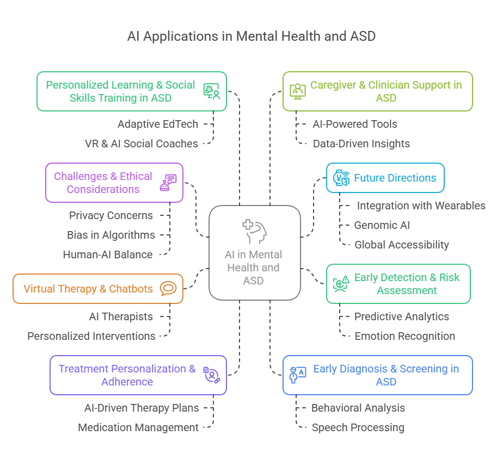Mental Health
Artificial Intelligence (AI) is transforming mental healthcare and support for Autism Spectrum Disorder (ASD) by enabling early detection, personalized interventions, and scalable therapeutic solutions. From AI-powered diagnostics to virtual therapy assistants, these innovations are improving accessibility and outcomes for individuals worldwide.
AI in Mental Health
1. Early Detection & Risk Assessment
Predictive Analytics: AI analyzes speech patterns, social media activity, and wearable data to detect early signs of depression, anxiety, or suicidal ideation (e.g., Cogito’s mental health monitoring).
Facial & Voice Emotion Recognition: Tools like Mindstrong and Ellipsis Health assess emotional states through vocal tones and facial expressions during telehealth sessions.
2. Virtual Therapy & Chatbots
AI Therapists: Chatbots like Woebot and Wysa provide CBT-based counseling, offering 24/7 support and coping strategies.
Personalized Interventions: Machine learning tailors therapeutic content based on user interactions and progress tracking.
3. Treatment Personalization & Adherence
AI-Driven Therapy Plans: Platforms like Ginger.io match patients with tailored therapy modules and human counselors based on AI analysis.
Medication Management: AI predicts optimal drug regimens and monitors side effects using patient-reported data.
AI in Autism Spectrum Disorder (ASD)
1. Early Diagnosis & Screening
Behavioral Analysis: AI tools (e.g., Cognoa’s FDA-approved app) analyze video recordings of children to flag ASD markers like eye contact or repetitive behaviors.
Speech & Language Processing: Algorithms detect speech delays or atypical patterns in toddlers, enabling early intervention.
2. Personalized Learning & Social Skills Training
Adaptive EdTech: Apps like Mightier use AI-driven games to teach emotional regulation to children with ASD.
VR & AI Social Coaches: Virtual reality platforms (e.g., Floreo) simulate social scenarios with real-time AI feedback to practice interactions.
3. Caregiver & Clinician Support
AI-Powered Tools: Systems like Behavior Imaging® enable remote ASD behavior tracking for therapists and parents.
Data-Driven Insights: AI aggregates long-term behavioral data to refine individualized education plans (IEPs).
Challenges & Ethical Considerations
Privacy Concerns: Sensitive mental health and ASD data require robust security measures.
Bias in Algorithms: AI models must be trained on diverse datasets to avoid misdiagnosis, particularly for underrepresented groups.
Human-AI Balance: Over-reliance on AI may reduce human empathy in care; hybrid models are essential.
Future Directions
Integration with Wearables: Real-time mood and stress tracking via smartwatches for proactive care.
Genomic AI: Linking genetic data with behavioral patterns to uncover ASD subtypes and targeted therapies.
Global Accessibility: Low-cost AI solutions for underserved regions with limited mental health resources.
AI is revolutionizing mental health and ASD support through early detection, personalized therapy, and scalable tools. While ethical and technical challenges remain, these advancements promise a future where mental health care is more precise, inclusive, and accessible to all.







AI for Mental Health
Transforming autism support through early detection, personalized interventions, and scalable therapeutic solutions.
Get in touch


Get in touch
83 Watsonbrook Dr. Brampton, L6R 0R5, ON, Canada
contact@aidoctrine.com
Shahed Tower, 10 Floor, Mirgab, Kuwait city, Kuwait
